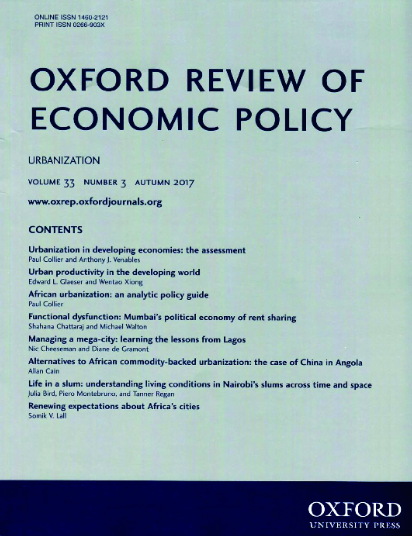政策互补性与碳定价悖论
IF 1.8
2区 经济学
Q2 ECONOMICS
引用次数: 1
摘要
我们提出了一个适用于气候变化问题异常广泛范围的经济学框架。它认为经济和社会进程,特别是那些涉及能源技术和系统的有目的过渡的进程,涉及决策的三个不同领域和相关行动者之间的相互作用。第一个问题涉及小规模且通常是短期的决策,其中大部分反映了行为经济学中确定的广泛的“满足”和习惯化。计算出的经济优化决策,尤其是能源和能源密集型行业的公司,最好地反映了新古典经济学和福利经济学的核心假设,包括离散的市场失灵。第三,在最大规模上,是由大型参与者(如政府、大型跨国公司)做出的战略判断,这些判断与长期复杂系统的转型有关,特别是与创新和结构变化有关,进化经济学和制度经济学的理论教训与此最为相关。从经济上讲,这些可以逻辑地映射到技术(或者更准确地说,“最佳实践”)前沿。每一个都有相应的政策影响:最直接的影响分别体现在:(1)标准和参与建立规范;(二)价格起关键作用的竞争市场;(三)创新和基础设施方面的战略投资。每个国家都面临着执行和政府失败的挑战,例如,迄今为止碳定价完全不充分,naïve和提高能源效率的无效方法,或对研发的错误支持。基于领域差异,我们认为相应的政策支柱是天然互补的,并且可以相互支持:例如,强有力的能效标准和规范将通过减少其对消费者的直接影响来增强碳定价的政治空间,而碳定价与加强低碳创新具有多种积极的双向互动。由此,我们还假设了一个“碳定价悖论”:大多数经济学家的核心建议——适当的碳价格,只有在对其他支柱以及宏观经济和财政政策的更广泛背景给予同等的分析和政策关注的情况下,在大多数司法管辖区才是可行的(甚至是最优的)。只有这些其他方面可以减少碳定价的绝对成本影响(可能转化为收益),并为消费者和企业提供更好的低碳替代品,这对于在我们的经济中建立气候相容的定价结构至关重要。本文章由计算机程序翻译,如有差异,请以英文原文为准。
Policy complementarity and the paradox of carbon pricing
We present an economics framework appropriate to the exceptionally broad scope of the climate change problem. This considers that economic and social processes, particularly those involved in purposive transitions of energy technologies and systems, involve the interplay between three distinct domains of decision-making and associated actors. The first concerns small-scale and often short-term decision-making, much of which reflects extensive ‘satisficing’ and habituation as identified in behavioural economics. Calculated economic optimization decisions, especially of companies in the energy and energy-intensive industries, then best reflect the core assumptions of neoclassical and welfare economics, including discrete market failures. Third, at the largest scale are strategic judgements made by big actors (e.g. governments, large multinational companies) relevant to transformation of complex systems over long periods—particularly concerning innovation and structural changes, for which lessons from theories of evolutionary and institutional economics are most relevant. Economically, these can be logically mapped in relation to the technology (or more accurately, ‘best practice’) frontier. Each has corresponding policy implications: most directly, respectively in terms of (i) standards and engagement to establish norms; (ii) competitive markets with the critical role of prices; and (iii) strategic investment in innovation and infrastructure. Each faces challenges of implementation and government failure, as observed, for example, with wholly inadequate carbon pricing to date, naïve and ineffective approaches to enhancing energy efficiency, or misdirected support to R&D. Based on the domain distinctions, we argue that the corresponding pillars of policy are naturally complementary, and can be mutually supportive: strong standards and norms on energy efficiency, for example, would enhance the political space for carbon pricing by reducing its direct consumer impacts, while carbon pricing has multiple positive two-way interactions with enhanced low-carbon innovation. From this we also posit a ‘carbon pricing paradox’: that adequate carbon prices, the central recommendation of most economists, are in most jurisdictions only feasible (or even optimal) if equal analytic and policy attention is devoted to the other pillars, and the wider context of macroeconomic and fiscal policies. Only these other aspects can reduce the absolute cost impact of carbon pricing (potentially turning into a gain) and offer consumers and businesses better lower-carbon alternatives, which are critical to establishing climate-compatible pricing structures across our economies.
求助全文
通过发布文献求助,成功后即可免费获取论文全文。
去求助
来源期刊

Oxford Review of Economic Policy
ECONOMICS-
CiteScore
12.50
自引率
1.50%
发文量
41
期刊介绍:
The Oxford Review of Economic Policy is a refereed journal which is published quarterly. Each issue concentrates on a current theme in economic policy, with a balance between macro- and microeconomics, and comprises an assessment and a number of articles. It gives a valuable appraisal of economic policies worldwide. While the analysis is challenging and at the forefront of current thinking, articles are presented in non-technical language to make them readily accessible to all readers. The Oxford Review is aimed at a wide audience including government, business and policy-makers, as well as academics and students. It is required reading for those who need to know where research is leading.
 求助内容:
求助内容: 应助结果提醒方式:
应助结果提醒方式:


